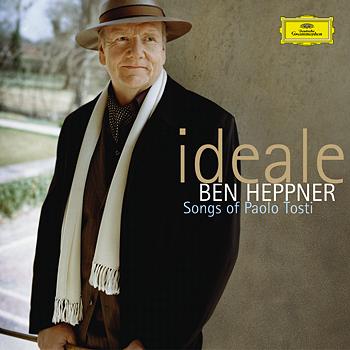|
<< -- 2 -- Tess Crebbin and Sissy von Kotzebue EMOTIONAL SOUND

Next, Heppner moved on to Sibelius, where it should be mentioned that he not only sang all seven Lieder by heart but that he also happened to sing them in Swedish. Heppner's facial expressions were able to convey the mood of the songs even though nobody in the audience understood the words. The Lied Flickan kom ifran sin aesklings moete ('Girl came from meeting with her beloved') was a welcome vehicle for Heppner to display a Lohengrin dramatic touch and it was where, for the first time, one really noticed that he is an opera singer as he acted the piece as much as he sang it. The dramatic aspects of a Wagner opera performance were unmistakably present. Technically impeccably sung was Saef, Saef, Susa ('Reed, Reed, Rustle'), which had some dramatic but clear piano and pianissimo parts, evoking images of disdain as a fair maiden drowns herself among the reeds. Svarta Rosor ('Black Roses') concluded the Sibelius segment and was followed by immense applause. The audience was, for the first time, officially allowed to clap and their clapping was supported by feet stomping, yelling, and exclamations of delight. They loved Heppner and had no qualms about showing it. Heppner took the hand of his accompanist, Craig Rutenberg, and together with his own raised it up in the air. The two men stood like two heavy weight boxing champions while the audience went mad with delight.
During the break that followed, audience members could be overheard talking about the performance and it became clear that many professional singers had come to attend the recital, hoping that some of Heppner's brilliance might rub off on them. Excitement spread like wildfire when the bell rang for the second half of the recital. It was in this half that Heppner was going to perform Tosti and nearly everyone present had bought the Canadian's best-selling Tosti CD and was now looking forward to hear him sing some of it in person.

ideale - Ben Heppner - Songs of Paolo Tosti. CD cover © Deutsche Grammophon
|
First, though, the audience sat through six Tchaikovsky Lieder, all sung in Russian and it was here that Heppner, for the first time, referred to the score as he sang, in a charming, not always flawless, pas-de-deux with the complicated Russian language. It was interesting to note that, as the recital advanced, so did the tempi and pitch of the pieces as they became increasingly higher and faster. The third Lied of this segment, Nam Swjosdy Krotkie Sijali ('The tender stars shine for us') was sung with such a lyric quality that one really was left to wonder why this man is known as a dramatic tenor, for he is clearly both. At the end of the last Tchaikovsky Lied, Denj li Zarit, Heppner showed that he is not a 'tenor star' who thinks of himself as something better. There is a fairly long piano part and Heppner turned toward the piano, closed his eyes and listened with abandon, letting the music wash over him with its emotional sound. When Rutenberg had played his last note, Heppner bowed to him and then the two men stood toward the audience as thunderous applause and shouts of 'bravo' greeted the end of this third segment. It remains to note that, following the performance, a Russian singer currently performing at the Bavarian State opera remarked on Heppner's clear Russian pronunciation.
Continue >>
Copyright © 18 May 2004
Tess Crebbin and Sissy von Kotzebue, Germany

|

